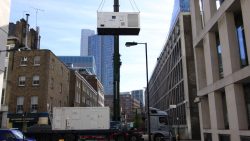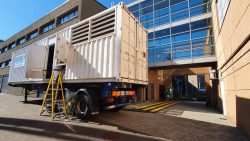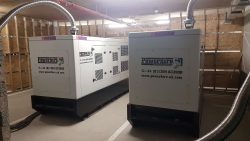Customer: Leading provider of technical services to the international energy, power and manufacturing industries.
End Client: World’s largest independent energy corporation operating in the UK since 1964.
Project Details:
Powerhire were contacted by a consultant engineering company on behalf of the world’s largest independent energy corporation requiring temporary generator power to power up one of their UK sites whilst being decommissioned prior to closing down. The temporary power is needed to power the equipment being utilised to decommission the site and pipelines.
Following the discussions between our Technical Sales Manager and their Decommissioning Electrical Engineer on the requirements needed, our Sales Manager produced a proposal for 3 off 500kVA generators in synch, a 20,000 litre bulk fuel tank along with a 2500Amp LV ACB Panel which was subsequently passed to the end-client.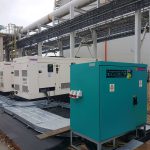
Following approval of the proposal, our Sales Manager and Sales Director attended a meeting with the end-client at their head office in Scotland resulting in an order being placed directly by them.
Due to the tight deadline imposed to enable site timings and requirements to be met, Powerhire were swiftly set up as a new approved supplier to ensure that we would be ready to meet the deadline for when the equipment was required.
Prior to the scheduled installation, a full witness test of all equipment was carried out in our testing bay at our Dover depot attended by our customer and the end-client. The successful witness test proved that all 3 off 500kVA generator sets worked in synch as they would on site. Two of the generators will be running 24/7 unlimited with the third in synch as a standby/load demand. The telemetry for remote monitoring of the generators and bulk fuel tank was also demonstrated to the client.
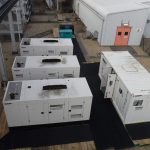 On the agreed delivery date, our logistics team transported the equipment to site using two of our own flatbed lorries which was then craned off and positioned by others on site ready for our Commissioning Engineer to start work.
On the agreed delivery date, our logistics team transported the equipment to site using two of our own flatbed lorries which was then craned off and positioned by others on site ready for our Commissioning Engineer to start work.
Prior to commissioning, the end client requested a change to the project to have the 3 sets running unlimited instead of 2, with them connected to our 2500A LV Panel and then site connected to a 3.3kV HV Transformer to feed the site.
A separate order was then placed for a 4th 500kVA generator set to be installed on the site to act as an emergency standby generator for essential services at another part of the site.
Our Commissioning Engineer worked closely with the site over the following two weeks to commission and test the sets and get them up and running.
Following issue of isolation permits needed to isolate the outgoing MCB to allow works to proceed on the generators, our Commissioning Engineer was able to get to work on all three generators. All three sets had a full inspection for oil, fuel and coolant, battery levels and voltages. Terminations and connections of the load cables to the transformer were also verified and checked. Generator synch cables were then fitted and the three generator sets run up. Each set was then individually started in ‘manual’ mode with the breaker closed, voltages and frequencies confirmed and then shut down via the emergency stop in the site main control room, to confirm that the sets can be electrically tripped and stopped remotely in the event of an emergency.
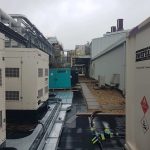 All three generator sets where then started in ‘auto’ mode as priority 1 machines to ensure they all synced together with voltages and frequencies verified. Following further tests on the transformer and HV board the telemetry was installed on the bulk fuel tank which was confirmed via the local digital gauge on site and via the ops room.
All three generator sets where then started in ‘auto’ mode as priority 1 machines to ensure they all synced together with voltages and frequencies verified. Following further tests on the transformer and HV board the telemetry was installed on the bulk fuel tank which was confirmed via the local digital gauge on site and via the ops room.
After the successful installation, testing and commissioning of all equipment, client training was given which included how to stop/start the machines, switching the machines off under load conditions and how to view the online telemetry. The telemetry allows remote monitoring of the performance of the generators including hours run, amperage, Kw and frequency levels and will send a SMS message to the office with a low fuel level warning to enable the site to anticipate fuel deliveries to prevent the fuel running out.
Before leaving the site in the capable hands of the client, our Commissioning Engineer ensured that a spares pack, including batteries, starter motor, drive belts, oil, coolant and filters, was put together to be left at site to make sure that in the unlikely event of a call out, our generator engineer is forearmed with appropriate equipment to rectify any fault. A service plan was put in place at 21 day intervals for the duration of the hire.
